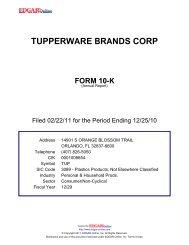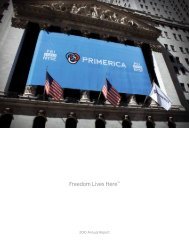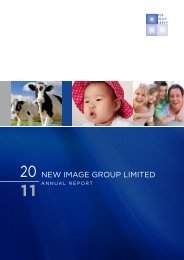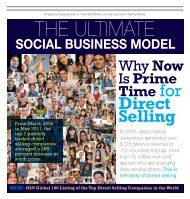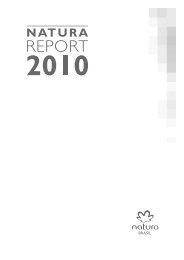Nu Skin 2010 Annual Report - Direct Selling News
Nu Skin 2010 Annual Report - Direct Selling News
Nu Skin 2010 Annual Report - Direct Selling News
Create successful ePaper yourself
Turn your PDF publications into a flip-book with our unique Google optimized e-Paper software.
take longer than we anticipated. Please refer to “Risk Factors” for<br />
more information on the risks associated with our planned expansion<br />
of direct selling in China.<br />
Regulation of Our Products. Our <strong>Nu</strong> <strong>Skin</strong> and Pharmanex products<br />
and related promotional and marketing activities are subject to<br />
extensive governmental regulation by numerous domestic and foreign<br />
governmental agencies and authorities, including the Food and Drug<br />
Administration (the “FDA”), the Federal Trade Commission (the “FTC”),<br />
the Consumer Product Safety Commission, the Department of<br />
Agriculture, State Attorneys General and other state regulatory agencies<br />
in the United States, and the Ministry of Health, Labor and Welfare<br />
in Japan and similar government agencies in each market in which<br />
we operate.<br />
Our personal care products are subject to various laws and regulations<br />
that regulate cosmetic products and set forth regulations for<br />
determining whether a product can be marketed as a “cosmetic” or<br />
requires further approval as an over-the-counter drug. In the United<br />
States, regulation of cosmetics are under the jurisdiction of the FDA.<br />
The Food, Drug and Cosmetic Act defines cosmetics by their intended<br />
use, as “articles intended to be rubbed, poured, sprinkled, or<br />
sprayed on, introduced into, or otherwise applied to the human body<br />
. . . for cleansing, beautifying, promoting attractiveness, or altering the<br />
appearance.” Among the products included in this definition are skin<br />
moisturizers, perfumes, lipsticks, fingernail polishes, eye and facial<br />
makeup preparations, shampoos, permanent waves, hair colors, toothpastes<br />
and deodorants, as well as any material intended for use as a<br />
component of a cosmetic product. Conversely, a product will not be<br />
considered a cosmetic, but may be considered a drug if it is intended<br />
for use in the diagnosis, cure, mitigation, treatment, or prevention of<br />
disease, or is intended to affect the structure or any function of the<br />
body. A product’s intended use can be inferred from marketing or<br />
product claims. The other markets in which we operate have similar<br />
regulations. In Japan, the Ministry of Health, Labor and Welfare regulates<br />
the sale and distribution of cosmetics and requires us to have<br />
an import business license and to register each personal care product<br />
imported into Japan. In Taiwan, all “medicated” cosmetic products<br />
require registration. In China, personal care products are placed into<br />
one of two categories, “general” and “drug.” Products in both categories<br />
require submission of formulas and other information with the health<br />
authorities, and drug products require human clinical studies. The<br />
product registration process in China for these products can take from<br />
nine to more than 18 months or longer. Such regulations in any given<br />
market can limit our ability to import products and can delay product<br />
launches as we go through the registration and approval process for<br />
those products. The sale of cosmetic products is regulated in the European<br />
Union under the European Union Cosmetics <strong>Direct</strong>ive, which<br />
requires a uniform application for foreign companies making personal<br />
care product sales.<br />
Our Pharmanex products are subject to various regulations promulgated<br />
by government agencies in the markets in which we operate.<br />
In the United States, we generally market our nutritional products as<br />
conventional foods or dietary supplements. The FDA has jurisdiction<br />
over this regulatory area. Because these products are regulated under<br />
the Dietary Supplement and Health Education Act, we are generally<br />
not required to obtain regulatory approval prior to introducing a product<br />
into the United States market. None of this infringes, however,<br />
upon the FDA’s power to remove from the market any product it determines<br />
to be unsafe or an unapproved drug. In our foreign markets,<br />
the products are generally regulated by similar government agencies,<br />
such as the Japan Ministry of Health, Labor and Welfare, the South<br />
Korea Food and Drug Administration, and the Taiwan Department<br />
of Health. We typically market our Pharmanex products in international<br />
markets as foods or health foods under applicable regulatory<br />
regimes. In the event a product, or an ingredient in a product, is classified<br />
as a drug or pharmaceutical product in any market, we will generally<br />
not be able to distribute that product in that market through our<br />
distribution channel because of strict restrictions applicable to drug<br />
and pharmaceutical products. China has some of the most restrictive<br />
nutritional supplement product regulations. Products marketed as<br />
“health foods” are subject to extensive laboratory and clinical analysis<br />
by governmental authorities, and the product registration process for<br />
these products can take from nine to more than 18 months or longer.<br />
We market both “health foods” and “general foods” in China. Our<br />
flagship product, LifePak, is currently marketed as a general food, as<br />
only two of the three main capsules have received “health food” classification.<br />
Currently, “general foods” is not an approved category for<br />
direct selling; therefore, we will only market LifePak through our retail<br />
stores until final “health food” classification for LifePak is obtained for<br />
the other capsule. Additionally, there is some risk associated with the<br />
common practice in China of marketing a product as a “general food”<br />
while seeking “health food” classification. If government officials feel<br />
our categorization of our products is inconsistent with product claims,<br />
ingredients or function, this could end or limit our ability to market such<br />
products in China in their current form.<br />
The markets in which we operate all have varied regulations that<br />
distinguish foods and nutritional health supplements from “drugs” or<br />
“pharmaceutical products.” Because of the varied regulations, some<br />
products or ingredients that are recognized as a “food” in certain markets<br />
may be treated as a “pharmaceutical” in other markets. In Japan,<br />
for example, if a specified ingredient is not listed as a “food” by the<br />
Ministry of Health and Welfare, we must either modify the product to<br />
eliminate or substitute that ingredient, or petition the government to<br />
treat such ingredient as a food. We experience similar issues in our<br />
other markets. This is particularly a problem in Europe where the<br />
regulations differ from country to country. As a result, we must often<br />
modify the ingredients and/or the levels of ingredients in our products<br />
for certain markets. In some circumstances, the regulations in foreign<br />
13



